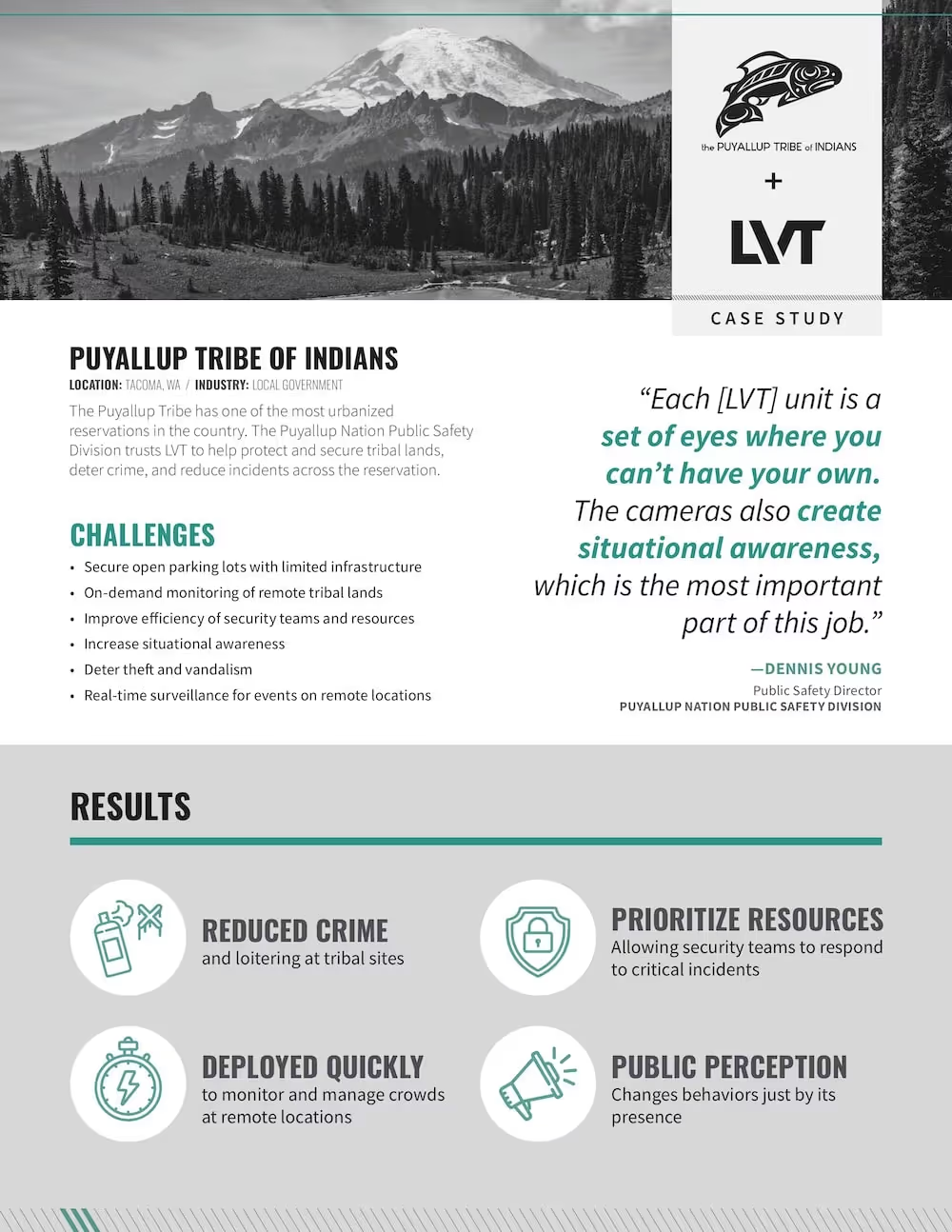The Importance of Public Safety—Puyallup Tribe and LVT Case Study
For the Puyallup Tribe, safety is key. They use every method they can to ensure public safety on remote tribal properties, during events, and more. Learn how LVT has helped their efforts.



There’s No Price on Public Safety
It’s all about family for the Puyallup Nation Public Safety Division. It is the driving force and reason for Dennis Young’s team. “It’s a family. It’s not just a job,” he said. “[The tribe is] taught to love and put family first. We exercise that in our daily work.” Young is the Public Safety Director for the division and has spent his career in the security field. In fact, “It’s the only job I’ve ever had,” Young laughs. He started as a security supervisor in the bingo room and has worked his way through the ranks.
His division is concerned with the safety and security of the Puyallup Tribe and those on their reservation. The Puyallup Tribe is one of the most well-known Native American tribes in the country. The reservation is located in and around Tacoma, Washington. Currently, the tribe has more than 5,000 registered members, with a majority living on the reservation.
Traditionally, the Puyallup are fishermen with a culture deeply rooted in family. Today, they are self-sustaining, and their reservation is one of the most urbanized reservations in the country. According to Young, it creates a unique setting for the tribe and others on and near the reservation. It also attracts thousands of people to tribal and community events.
The Puyallup Tribe is governed by the Puyallup Tribal Council, a group of seven elected officials that serve three-year terms. The council oversees the operations, economics and finances, and community wellness for the tribe. This includes overseeing and approving all security measures and expenses.
Protecting the community
Young and his team were tasked by the tribal council to improve surveillance throughout the reservation, particularly at events. He quickly realized that the remote and temporary locations required mobile security units. If the tribe went with traditional cameras, Young then had to ask, “Who is going to install them? Where will they be installed? After the event, who is going to take them down?” Furthermore, the events are held in large, remote areas that don’t have access to traditional power or facilities and only need surveillance during the events. That’s when Young and his team started investigating mobile surveillance units.
One of his team members saw a unit from LiveView Technologies in a local grocery store parking lot and sent a photo to Young. He knew immediately this is what they needed because LVT Units are completely wireless and are mobile. “The presence these units create is instant,” he said. “[It] changes the way people behave.”
The fireworks season is one of the biggest events that the safety division provides security for. During July, hundreds of vendors gather on tribal land to sell fireworks to thousands of visitors and locals. “Fireworks season is like the wild west,” said Young. “We have 20 security personnel and 10 police officers for 30 days, but we still needed more eyes.”
LVT Units were the perfect fit for Young and his team because they are wireless, use active deterrence, and they are easy to relocate after the event is done. “In today’s world you’re always looking over your shoulder,” said Young, “and seeing [the trailer] sitting there makes [people] feel safer.”

Top-of-the-line features
LVT Units use high-quality hardware and software. Each unit is ruggedized so it can be stationed in a remote field or even on a busy street corner without the weather affecting it. Each unit can be equipped with flashing lights, a two-way speaker, different types of cameras, and more. Furthermore, the pan, tilt, zoom (PTZ) cameras produce high resolution images and video. In fact, they are one of Young’s favorite features. “The PTZ is flawless. We’re used to digital zoom, but with a mobile unit you have to be able to move the cameras, and [LVT’s] absolutely works with no latency,” he said.
The quality of the cameras actually augments the department’s personnel and gives them eyes on things and places that they couldn’t otherwise have had. Furthermore, they increase situational awareness for the entire department. Not only do the cameras help them know what is going on, but also where and if they should send personnel. They help the department increase efficiency and safety for their security officers. For example, instead of sending several employees into a potentially dangerous situation, Young and his team can assess the situation remotely and contact proper authorities. “Let the camera do its job,” he said, “it protects the staff.”
The other feature that Young and his team loves is the portability of the units. In fact, they have stationed their units at different locations across the reservation, including at the tribal docks, during the Halloween parade, at the cultural center, and even outside of their administration building which is next door to the casino. Prior to stationing a unit outside of the cultural center, the tribe had $20,000 of unique cedar stolen. They use the cedar to carve paddles and other traditional tools and keepsakes. After deploying the unit, the thefts stopped. “[The LVT Unit] sure stops it,” said Young. “I can’t believe the difference it makes. It works great in the night and even during the rain.”
Worth the cost
Young is constantly working with the tribal council to improve security and safety on the reservation. “We’ve implemented every safety measure the tribal council will allow,” he said. When it came to purchasing LVT Units, Young had to show the council that the added security was worth the cost, especially for areas they already had cameras set up. Technology can now do what used to take 10 to 15 men, he said, and that is an instant cost savings. However, the greatest savings is one that is impossible to calculate—increased safety.
“There’s no price on public safety,” said Young. It is too important to get wrong.
You'll Also Love These!
Test Out the Best Security Strategy
We offer a free consultation and a custom end-to-end security strategy for your unique situation. Connect with an LVT specialist to see if you qualify for a risk-free trial.

.avif)

.png)


